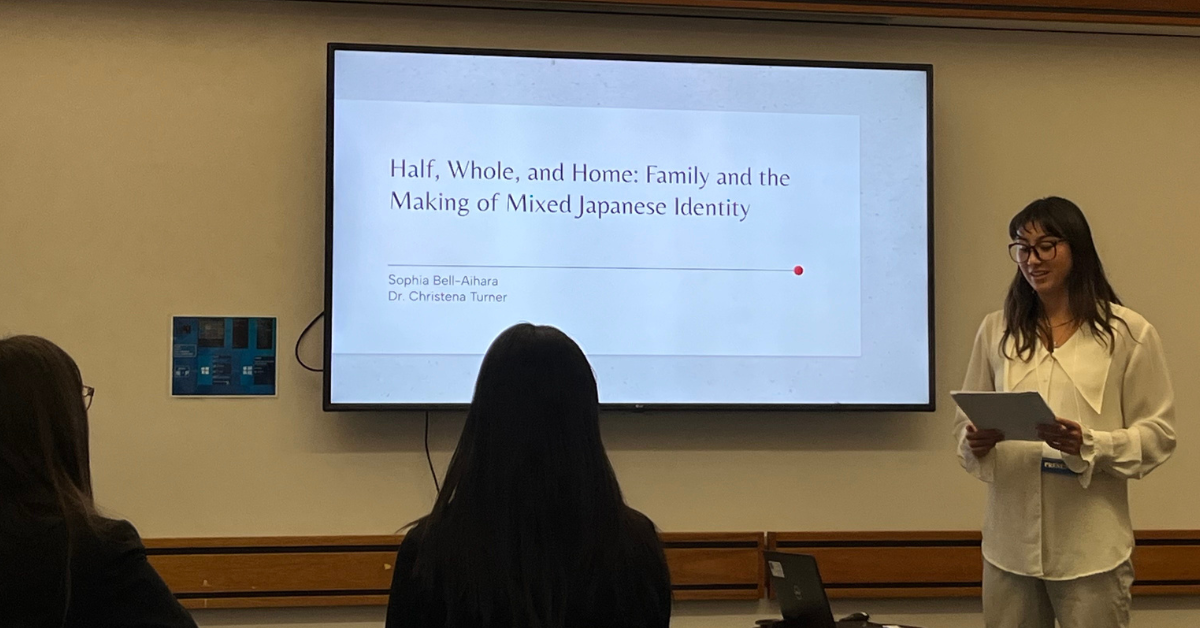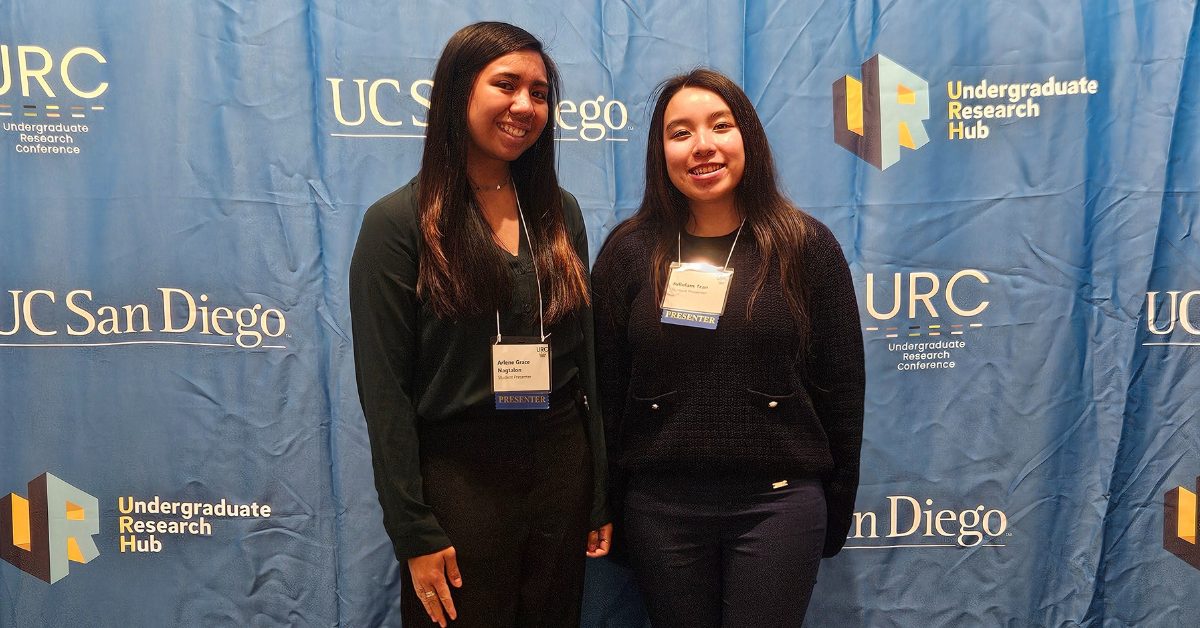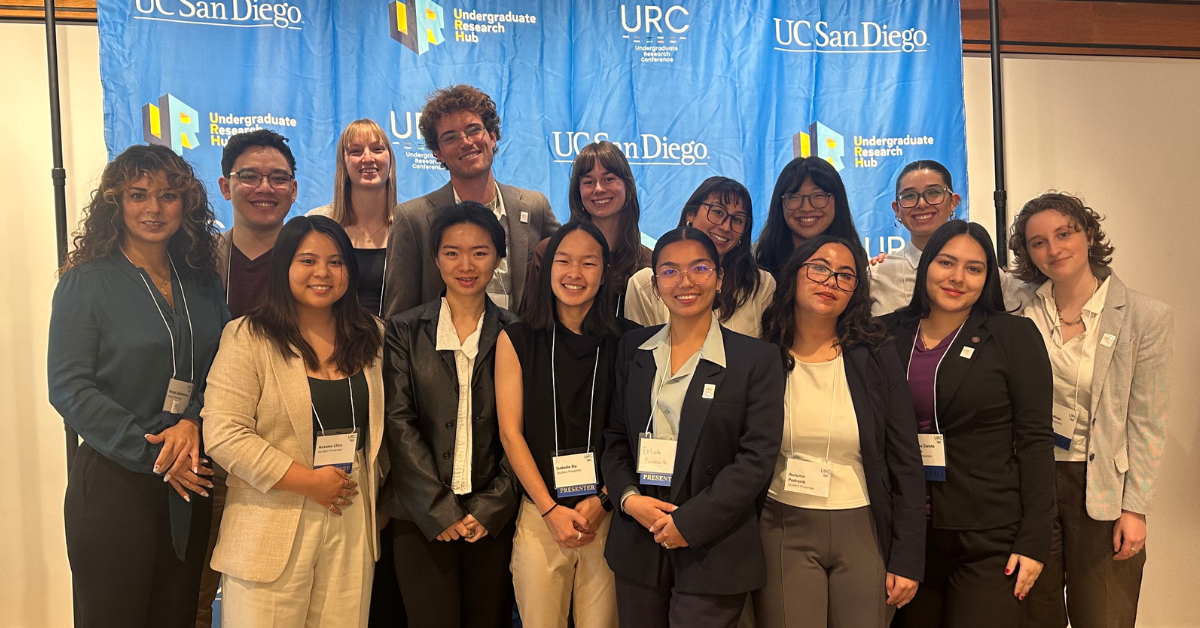Undergraduate Research Presents New Frontiers in Annual Conference
Published Date
Story by:
Media contact:
Topics covered:
Share This:
Article Content
For UC San Diego students Sophia Bell and Arlene Grace Nagtalon, participating in the recent Undergraduate Research Conference (URC) was a unique opportunity to present their research to the campus community. Sponsored by the Undergraduate Research Hub, URC stands as only one of their many programs and initiatives focused on creating environments for students to engage and integrate in the UC San Diego research community.
“Not only was it an incredible opportunity for me to practice presenting to an audience with varied backgrounds, but it also allowed me the chance to see what other research is happening outside of my field of study,” said Nagtalon, a fourth-year student who presented at the conference for the second year in a row. “I'm grateful for the experience to see more reasons why UC San Diego is a world-renowned research institution.”
Now in its 38th year, URC continues to grow with this year's conference being the largest in terms of participants, showcasing 250 students. Each participant is nominated by a UC San Diego faculty member and presents their findings from research they had conducted throughout the year. Read on to learn more about Bell's and Nagtalon’s work.
Finding Belonging through Research
Research often starts from finding needs, studying relationships and bringing awareness to topics. For Bell, it began from personal experience.

Coming from a mixed Japanese background, the third-year Sociology major and Seventh College student, questioned the complexities that arose in children whose parents came from different racial and cultural backgrounds. Observing not just her own life but the lives of those around her culminated in her research.
“My interest in this topic emerged during a previous project where I employed participant observation to study my fellow mixed Japanese swim teammates,” shared Bell. “I noticed striking commonalities in our attitudes toward discipline, teamwork and cultural connection.”
Bell decided to explore this idea further in her project,“Half, Whole, and Home: Family and the Making of Mixed Japanese Identity, ” which focuses on observations made on children in multiracial households and the significance of belonging to individual well-being.
With this research, Bell hopes to impact community members who share a mixed heritage. “As someone who has grappled with uncertainty about where I fit in,” she said, “I hope my project can reach parents who can help guide their mixed kids to feel a whole sense of belonging.”
Bell notes that she owes her mentor, Department of Sociology professor, Christena Turner, significant credit for her work. From constructive comments to meetings every week, Bell believes this research wouldn’t have been possible without her help. “If it weren't for Professor Turner’s suggestion to apply to the Sociology honors program and submit my thesis to the URC, I wouldn't have done either of those things,” she added.
Building a Better Microbiome Model
Nagtalon, a Revelle College student and double major in Molecular and Cell Biology and an Individual Studies Major in Community Research, Education and Well-Being, was thrilled to return to the URC, this time with fascinating findings on the human gut microbiome. Her lab’s project, “Validating a reproducible in vitro microbiome culture for high throughput drug screening,” seeks to create a microbiome model that can be used in future experiments to test various metabolites that combat antibiotic resistance in the gut microbiota.
With such a complex topic, one of the challenges Nagtalon and co-presenter Julielam “Julie” Tran faced was how to present their research in a way that’s accessible. “It's important to discuss our research not only with other professionals but those who have little-to-no background in the field, especially when it applies to them,” said Nagtalon.
With the help of their faculty mentor Erika Cyphert, assistant professor of Bioengineering, their graduate student mentor Avani Tantry, and the rest of the Cyphert Lab at the Shu-Chien Gene Lay Department of Bioengineering, the duo was able to prepare by ensuring that, “as long as our audience can follow along with and understand the gist of our work, then we would have done our job as presenters.” In addition to providing oral presentation expertise, Nagtalon said Cyphert’s background in working with gut microbiota proved invaluable.
“It's my fervent belief that every student should have the chance to present at a conference at least once, even if you're not interested in pursuing a career in research,” Nagtalon notes. "Future URCs will allow other students to realize the power in their work and the work their peers have on the future they aspire to create."

Arlene Grace Nagtalon (left) and her co-presenter Julielam “Julie” Tran (right) posing for a photo at the Undergraduate Research Conference
Stay in the Know
Keep up with all the latest from UC San Diego. Subscribe to the newsletter today.




